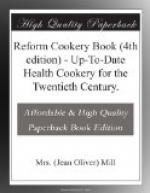Another excellent kind of bread, which can be managed quite easily with a little trouble and practice, is raised with eggs. It is generally known as
Wallace Egg Bread,
and as I have the recipe direct from Mrs C. Leigh Hunt Wallace, the inventor of this kind of bread, I am able to pass it on at first hand.
Ten ounces wheatmeal, 1 large egg (weighing 2 ozs.), 1 gill milk and 1 gill water, the whole to be made into a batter, the white of egg being beaten separately to a stiff froth and incorporated with the batter very thoroughly but very quickly; the whole to be baked in 1 lb. cake or loaf tin, the tin being very hot and thoroughly oiled or buttered before the batter is turned into it. Put for 50 minutes in a very hot part of the oven (350 degrees to 380 degrees fahr.) and keep in another 50 minutes to soak. I can vouch for the excellence of this bread, and may say that I have managed it with very little difficulty. I use a gas oven and loaf pans made of black steel, as these take and retain the heat much better than tins. If any amateur, however, is doubtful as to how this loaf should be, she cannot do better than send for a sample loaf or two to the Wallace Bakery, 465 Battersea Park Road, London, S.W. There is also a depot in Edinburgh—Messrs Richards & Co., 7 Dundas Street, where these can be got. By comparing one’s own achievements with these, one will be the better able to attain the desired result. In case any may think this egg bread sounds expensive, I may say that it is exceedingly economical to use; a small loaf going much farther than a large one of the ordinary puffed-up kind.
PASTRY.
“’Meat for Repentance’—Pork pies for supper—or otherwise!”
Short Crust.
Take 1/2 lb. flour, mix with it 1/2 teaspoonful baking powder and put two or three times through a sieve. Rub in 4 ozs. butter. If vegetable butter is used, 3 ozs. will do, as it contains much less water. Beat up an egg. Add a teaspoonful lemon juice to the flour, &c., nearly the whole of the egg, and mix into a very dry paste with cold water. The mixing is best done with a knife. Turn out on floured board and form into an oblong piece, still using a broad knife as much as possible. Roll out evenly a good deal larger than the dish to be covered, and cut off a piece all round, leaving it the exact size and shape. Wet the edges of the dish, put a band of paste on. Wet that again, and lay on the cover. Make the edges neat with a knife or pastry cutter. Brush over with egg and bake in very hot oven for thirty to forty minutes. If used for covering a fruit tart, dust over with sifted sugar before serving.




